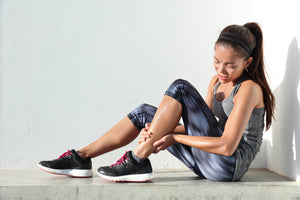5 Ways to Help Relieve Sore Muscles Post Workout
September 01, 2020

Getting sore muscles after a good workout can be manageable to almost incapacitating. Is there any way to help prevent and boost our muscle recovery so that we can feel better faster? Post workout soreness is very common, however, it's good to know what we can do to stop or prevent it.
What are the Levels of Muscle Soreness?
Muscle discomfort can vary from acute muscles soreness to an actual injury. Acute muscle soreness is when you feel a burn while you are exercising. This feeling helps tell you when it's time to stop and that you may be over working a certain muscle.
Then after working out, you may feel that your entire leg, glutes, or arms are sore. If it's an injury, the pain or discomfort is more focused on a particular point and is associated with a specific movement that cause a sharper pain. In that case, in may good to go see a doctor to check if the sharp pain persists.
Another way to try to gauge is what you're feeling is muscle soreness or an injury is that acute muscle soreness usually begins to feel better after three days, whereas if there is continued pain for a week or more, it might be an injury. Again, in that case, it may be smart to check in with your doctor. Now, the question we all want the answers to. How can we ease post workout muscle main and quickly recover?
How to Help Ease Muscle Soreness
1. Light Workout
No way! You may be thinking, "I'm so sore, I don't want to move, let alone workout!" However, getting up and moving helps with your blood circulation, which turn helps bring nutrients to your muscles and aids in speeding up your muscle repair process. Although this concept is still being researched, it is known that the blood carries nutrients and oxygen to our muscle tissue, so ideally, the better the circulation, the faster they can reach your muscles, and the faster you can feel better.
Now regarding working out, we're not talking about going back into your normal hardcore workout, but rather light workouts. Depending on how sore you are, you can try some light activities such as walking, jogging, or biking. Whatever it is that can help get your blood flowing faster. However, please make sure that you are actually doing very, very light workouts, as you do not want to cause additional damage to your muscle tissues. When in doubt, just rest.

2. Stay Hydrated
Some studies have connected muscle soreness with being dehydrated. Although more research needs to be done, water can help us flush our waste products, and when our muscles break down, they do release waste & toxins. Drinking lots of water can help aid in that process of flushing out these waste products, which many aid in reducing muscle soreness.

3. Light Stretches
Please make sure again that you are doing "light" stretches, as we don't want to cause additional damage to our muscles. That being said, light stretching post workout can help release the tightness and help you to feel better. However, with everything there needs to be a balance. Over-stretching can actually make your muscles feel even more tighter. How can we make sure we don't overstretch? Stretch only right before it feels tight and for not more that 5-10 seconds. Never force your to stretch to the point where it is unbearable or causes intense pain. If the idea of stretching is just too painful for you to even think of at the moment, you can just rest and let time heal your sore muscles.
4. Heat or Ice Your Muscles
Now, everyone has different sayings on what you should apply first when you have sore muscles, but in the end, that choice is up to you. Also, any relief you feel from putting on an ice pack or a heat pack is, for the most part, only temporary (if done safely). Icing your muscles can help reduce swelling and pain. Putting a heat pack on the sore areas can help minimize the tightness and the pain signals. You can even soak for a few minutes in a warm bath to loosen your muscles and help you feel better.

5. Magnesium
We absolutely need magnesium in order for our muscles to function properly. It works with other minerals in our body to help keep our muscles loose and flexible. When we workout, magnesium is what helps relax our muscles and lessen the build-up of lactic acid, which cause muscle tension. When your body does not have enough magnesium, you are more likely to experience muscle aches, fatigue, spasms, tightness, and weakness.
In the USA, nearly 75% of adults are magnesium deficient. That is why many turn to magnesium health supplements. Magnesium glycinate and malate helps provide stress relief and relaxation benefits*. Especially Magnesium Malate helps relieve muscle tension by relaxing tense areas. We recommend trying
FarmHaven's Magnesium supplement to help with post workout muscle recovery.


